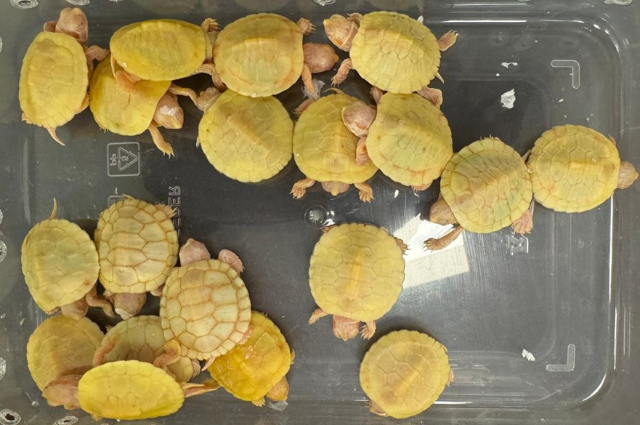In a significant move to protect wildlife, the Chennai Customs Department along with the Air Intelligence Unit (AIU), intercepted a major attempt to smuggle endangered turtles. The customs team that was working diligently had seized a large number of turtles from individuals attempting to bring them into India illegally.
A Large Haul of Turtles Seized
The operation took place on September 27, 2024, when customs officers apprehended two passengers arriving from Kuala Lumpur. These passengers were found carrying a staggering number of turtles—4,967 red-eared slider turtles and 19 albino red-eared slider turtles. The red-eared slider turtle is a species commonly smuggled due to its popularity as a pet, but such illegal trade poses a serious threat to the ecosystem.
Swift Action by Authorities
The Customs Department made it clear through a statement on X (formerly Twitter) that the turtles were confiscated under the supervision of the Air Intelligence Unit. The authorities acted swiftly, not only seizing the turtles but also arresting the two passengers involved along with their contact who was supposed to receive the shipment. All three were arrested under the Customs Act of 1962, which governs illegal imports and exports in India.
Significance of the Seizure
This seizure highlights the growing problem of wildlife smuggling which often targets endangered species. The red-eared slider, while common in certain parts of the world can cause ecological harm if introduced into non-native environments. The albino variety, being rarer, fetches a higher price in the black market further motivating illegal trade.
Vigilance at the Borders
The successful interception by Chennai Customs is a reminder of the importance of constant vigilance at international borders. Smuggling operations often exploit loopholes, but coordinated efforts by customs and intelligence units can significantly curb illegal activities. In this case, the authorities not only protected the ecosystem but also sent a strong message that smuggling wildlife is a serious offence with severe consequences under Indian law.
The illegal trade of endangered wildlife poses a serious threat to global biodiversity. Recent incidents in Chennai highlight the ongoing struggle against this unlawful activity.
Smuggling Attempts in Chennai
On August 16, 2024, the Air Intelligence Unit (AIU) at Chennai Airport apprehended three individuals attempting to smuggle 778 Indian star tortoises to Kuala Lumpur. These tortoises are protected under the Wildlife (Protection) Act of 1972, which aims to safeguard India's rich biodiversity. The customs department reported that the tortoises were discovered during baggage inspections that was leading to the arrest of the three passengers involved in this crime.
Broader Context of Wildlife Trafficking
This incident is part of a larger pattern of wildlife trafficking in India. Just days earlier, on August 10, customs officials seized various exotic animals from a passenger arriving from Bangkok. These actions emphasize the critical need for stringent enforcement of wildlife protection laws and international cooperation to combat smuggling efforts.
The consequences of such smuggling extend beyond legal repercussions; they threaten the survival of species and disrupt ecosystems. Continued vigilance and public awareness are essential in the fight against wildlife trafficking, ensuring that both authorities and citizens work together to protect endangered species.
Rising Turtle Smuggling on India's East Coast: A Growing Concern
Turtle smuggling activities have been increasing significantly along the East Coast of India, especially in states such as West Bengal, Odisha, and Andhra Pradesh. These illegal activities are part of a flourishing underground network, where live turtles are transported to major cities like Chennai, Bangalore, and West Bengal, ultimately destined for export to international markets. One of the key routes for smuggling these turtles is through Visakhapatnam, which has emerged as a safe transit point for smugglers.
Wildlife Rescue Operation in Visakhapatnam
In a recent crackdown, officials from the Directorate of Revenue Intelligence (DRI) successfully intercepted a smuggling operation by rescuing 396 endangered turtles at the Visakhapatnam railway station. Among the rescued species were Indian Star turtles and Indian Tent turtles, both of which are listed as endangered and protected under India’s wildlife conservation laws. The illegal trade and smuggling of these turtles can lead to severe penalties under the Customs Act and the Wildlife Protection Act.
A senior forest department official highlighted the widespread nature of this illegal trade, stating, "The East Coast and South India have become hotspots for turtle trafficking. Smugglers gather these turtles from states like Odisha, Andhra Pradesh, Karnataka, Telangana, and Tamil Nadu, primarily for export. The Indian hard-shell turtles are mostly trafficked for the pet trade, while soft-shell turtles are smuggled for meat consumption or research purposes."
Uncovering a Smuggling Operation in Anakapalli
In another instance, a van accident on its way to West Bengal led to the discovery of a large-scale turtle smuggling operation. The vehicle on route from Vijayawada to Visakhapatnam, overturned in Anakapalli, exposing a consignment of around 400 freshwater turtles. Forest officials swiftly seized the turtles, further shedding light on the extensive network involved in the illegal wildlife trade. A DRI official, speaking anonymously had confirmed this incident and noted the persistent challenges in curbing the illegal transport of turtles in the region.
The Legal and Environmental Impact
The illegal trafficking of endangered turtle species poses not only legal repercussions but also significant environmental consequences. Turtles play a crucial role in maintaining the ecological balance and their depletion through illegal trade threatens biodiversity. Strict enforcement of the Wildlife Protection Act and continued vigilance by authorities are essential to combat this growing issue.
. . .
References:

